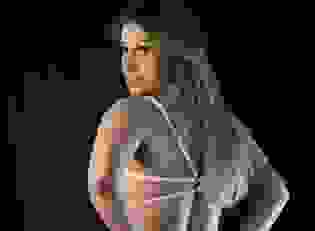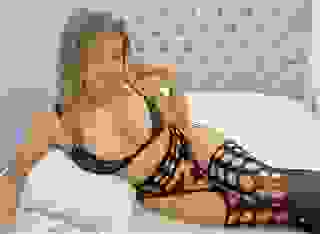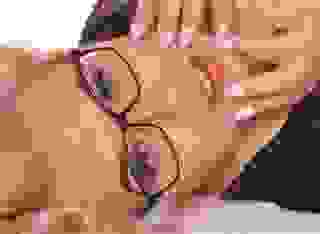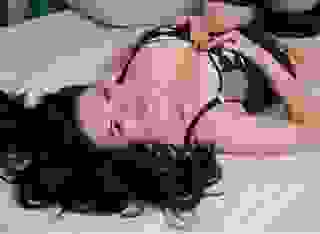Note: You can change font size, font face, and turn on dark mode by clicking the "A" icon tab in the Story Info Box.
You can temporarily switch back to a Classic Literotica® experience during our ongoing public Beta testing. Please consider leaving feedback on issues you experience or suggest improvements.
Click hereShe shook her head and looked at me with the same disappointment a parent might show toward a stubborn child. "Adam, I can't. We've talked about this."
"What is it with you? Why are you so determined to be a martyr when there's a better option right in front of you!"
"Why are you acting like I'm being the unreasonable one? You already promised me―promised me―that you'd walk away."
"I was just buying time," I shouted, exasperated. "Did you really think I'd be okay with a solution where I just leave you at the mercy of a psychopath?"
"So you've been deceiving me?"
"I've been trying to help you! But if that's the way you view it, then fine. I've been deceiving you. How's it feel to be on the receiving end?"
Carina's eyes narrowed and her jaw tightened.
"You insufferable ass. You saw with your own eyes what Fletcher is like. Let's say I take the deal and Ratliff actually follows through on his offer to protect me and Mila. What do you think happens to you?"
She glared at me. I didn't look away, but I also didn't answer.
"If I take that deal," she said, "I'm signing your death warrant."
"And how do you think Ratliff will react if I come back to him empty handed?" It was a weak counter, but the only one I had. I opened the photo gallery on my phone and slid it across the table to her.
"I've been examining these paintings for weeks, promising him I was on the cusp of finding proof of fraud. You know what I've found? Nothing."
She picked up my phone and scrolled through the photos in silence. I'd taken dozens to document my progress, or lack thereof. Some showed the entire painting, whereas others were closeups of a specific area that seemed like a promising target for analysis. She swiped through each one, sometimes flipping back to a previous image. I bristled at the way she admired her handiwork.
"Give it back," I said, reaching for my phone.
She leaned away from my grasp and continued to scroll. Several times she paused, and her brow furrowed as she pinched and zoomed on an image.
"Adam," she said, eyes glued to the screen. "These paintings, they're ..." She trailed off.
"Exquisite? Perfect? You can stop gloating."
She looked up. Her face was pale. "No. They're not my work."
I studied her eyes for a moment, then snatched my phone from her hand. "I'm not in the mood for games."
"I mean it."
"How could you possibly know that from a set of photos?"
"Because I know."
I brought the phone close to my face and stared at the image she'd been viewing. "What are you talking about? Did you see something that I missed?"
"It's not what I see. It's what I feel. A mother knows her child. I can't explain it better than that." She caught the skeptical expression on my face. "You don't believe me."
"I didn't say that. But I've been examining these painting for weeks, and—"
"And that explains why you haven't found evidence of forgery. Because there's no evidence to be found. The paintings that Ratliff recovered aren't mine. They're the originals."
"But then why would Fletcher be so ..."
A series of loud bangs filled the kitchen. We both started. Someone was pounding on the door.
"Carina Savchenko," shouted a familiar baritone voice. "Detective Sergeant Benjamin Ratliff, Metropolitan Police. We have a warrant for your arrest."
Carina's eyes met mine. I could read the unspoken question in her pained expression. Did I intentionally lead the police here to force her hand with Ratliff?
"I didn't know," I said. "I swear."
"There's no use running," Ratliff called. "We have officers at every exit."
Carina looked away. She rose from the table and opened the door. Ratliff entered, towering over her.
"Ms. Savchenko," he said. "What an absolute pleasure."
Carina crossed her arms and glared at him. His eyes made a slow sweep of her body.
"Your photos don't do you justice," he said. "You're even more striking in person. Pity. Prison won't be kind to you."
He spotted me standing near the table and gave an exaggerated wave.
"Ah, Mr. Weber. You see?" He gestured toward Carina, who was being handcuffed by another officer. "The power of deadlines!"
"Son of a bitch. You said I had forty-eight hours."
He shrugged. "I lied. Once I lost confidence in your ability to deliver what I wanted, I decided instead to take what I could get. I hoped a deadline might encourage you to do something rash. You didn't disappoint.
"Even without Fletcher, the arrest of the world's most notorious forger is a monumental achievement for our unit. We couldn't have done it without you."
I clenched my fist and stepped forward.
Ratliff smiled. "If you're that eager to join her in prison, assaulting a constable during the execution of his duty carries a six-month sentence. Seems a small price to pay for the satisfaction of teaching me a lesson. What do you say?"
Carina's eyes met mine. "Adam's too smart to fall for that shit. He sees right through it." She spoke the words slowly, willing me to grasp her meaning. "He wouldn't hurt a fly." She fixed me with an intense stare. "Understand?"
Carina was wrong. I was dying to hurt someone. But I understood. I'd be no help to her behind bars. I relaxed my hand.
Ratliff turned back toward Carina. "Are you familiar with Koestler Arts, Ms. Savchenko? They host an annual exhibition of artwork made by prisoners in the UK. I look forward to your entry next year. In fact, I plan to purchase it to hang in my office. When a hunter bags a trophy buck, he makes a deer mount for his wall. This will be my way of mounting you."
Ratliff looked over his shoulder at me. "What do you think, Mr. Weber? You have experience in this area. Should I mount her?"
"You're a pig," Carina spat.
"I'm a detective sergeant," Ratliff corrected. "And you're under arrest."
*******
"Imbécile!" Max shouted.
His face was red and his fingers were clamped to the steering wheel. I'd called him as soon as I was released from custody and had my phone returned to me. "What did I tell you would happen if you tried to save her?"
"I fucked up. I know. But I'll find some way to fix this."
"Fix it? Listen to yourself. You still think you can fix this? You will only make it worse. That is all you have ever done since you came into her life."
"I have to try."
"Fletcher has Mila," Max said. "Did you know this?"
"What?" I felt as though I might throw up.
"He thinks you set up Carina's arrest to force her to testify. Mila is leverage to make sure Carina stays quiet."
"Fuck."
"Yes. Fuck."
"How did he find out about the arrest so soon?" I asked.
"Je ne sais pas. Fletcher has many ears."
"Why would Ratliff move on Carina without first protecting Mila? He's a fool."
"Now that he knows Carina will not flip, he has no need to protect her sister. He is no fool. He just does not care who gets hurt."
I stared out the window. My mind kept returning to the dawning surprise on Carina's face as she browsed the photos on my phone. It had taken me a while to appreciate the full implications of that revelation, especially after the shock of Carina's arrest. But now I realized it might be the key to saving her.
"Do you know who bought the Turners?" I asked.
He glared at me but said nothing.
"Max?"
"Someone very rich and very dangerous."
"Good. I have to talk to him."
"He would kill me for even asking. Then he would kill you."
"That's a risk we'll have to take."
"Oh, will we? And why is that?"
"They're genuine, Max. The paintings the police recovered."
He scoffed. "That is absurd. Just because you could not spot a flaw in Carina's work, does not mean—"
"Carina said it herself. When I showed her the photos. She said they weren't hers."
He paused. "But that is impossible. How could she tell this?"
"I asked the same thing. She said she just knew."
Max remained quiet. I could tell he was running through scenarios in his head.
"You know what this means," I said. "Fletcher was double dipping. He sold the forgeries to one buyer, then planned to find another buyer for the originals. But Ratliff stumbled onto the originals before Fletcher could unload them. Fletcher must have been pissed, but he made the best of it and pretended that he planned all along for the paintings to be found."
"If the paintings at the Tate are genuine, why was Fletcher worried you might expose them as forgeries?" Max asked.
"He wasn't."
"Then why did he threaten you?"
"Because he must be terrified of the buyer. He needed everyone—you, me, his lackeys—to believe the recovered paintings were fake. He couldn't risk having anyone outside his inner circle know he was selling the same painting twice, because word might get back to the buyer.
"How do you think that buyer is going to feel if he learns the multimillion-dollar Turners he bought are forgeries? I need to talk to him, Max."
Max considered my words for a long moment, then shook his head. "Even if you are right and the paintings that he bought are Carina's work, you still need to prove they are forgeries. Carina is too good. You will fail. And then we will both die."
"I can do it. I have to do it."
"No. Your arrogance has already cost me far too much. It will not cost me my life."
"So what happens to Carina?"
"She goes to jail. It is better than death."
"And her sister?"
"She lives. Carina will say nothing."
"You're right. She won't tell the police a thing, which means they'll throw the book at her. She'll rot in prison, Max. I know you don't want that."
"No!" he shouted. "I do not want that! Which is exactly why I asked you to stay out of her life."
"I couldn't. I love her."
He slammed the brakes and jerked the car to a stop on the side of the road. His eyes locked with mine. His voice was thick with rage and grief.
"Then you should have let her go."
*******
I needed Max to set up a meeting with the buyer. I knew he wouldn't even consider it unless he felt I could convince the buyer that his paintings were forgeries. But how could I prove that without first examining them?
Maybe there was something in the originals I could use to demonstrate that Carina's versions were fakes. It seemed unlikely, but it was my only option. I returned to the Tate the next morning and set to work.
I'd have to take a different approach to my analysis. If I were to meet with the buyer, I wouldn't have access to the instruments I typically relied upon to scrutinize pigments for evidence of forgery. I couldn't exactly transport a bulky FTIR microscope to a meeting, and I doubted the buyer of a stolen masterpiece would let me tote it to the nearest lab for analysis.
Instead, I focused my attention on areas where I might be able to show the buyer a visual discrepancy. I began by studying the paintings' craquelure, the delicate pattern of cracks on the surface of the paint that develop over time. This type of analysis was better suited to authenticating older works: jagged cracks perpendicular to the wood grain were common in 14th-century Italian panel painting, whereas 18th-century French canvases could be expected to display random cracks with smooth, curved lines. In paintings from Turner's time, cracking was more subtle and usually caused by bitumen, a dark brown pigment that Turner and his contemporaries used for shadows. I compared the cracks against the museum's archival photos to confirm they were identical, then snapped photos that I enlarged and printed.
I also photographed other areas of interest. I noted two spots where fragments of brush hairs were embedded in the paint. Maybe Carina had missed one of them. A few small areas of flaking might prove useful, too. Turner often continued to tinker with his paintings after they had dried, and since fresh oil doesn't adhere well to dry paint, the newer paint tended to flake away with time. If Carina hadn't been able to replicate the flaking accurately, it could be enough to make my case.
By the end of the day, I'd collected enough visual markers to spark a flicker of hope. Still, I knew it wouldn't be enough to convince Max. I needed more. Something concrete.
It was difficult to focus on my work because my mind kept returning to Carina. I thought about our last moments together. We'd never even had a chance to say goodbye. Her final words had been a warning, urging me against punching Ratliff, trying as always to protect me from my own impetuous nature.
The more I thought about her, the more something she had said kept rattling around my brain. I tried to force it aside and devote my full attention to The Decline of the Carthaginian Empire. I was admiring the sun's reflection in the Mediterranean when it hit me. Carina had given me a clue to unlocking the forgeries.
I spent an hour researching my hunch. The test I wanted to run was unorthodox. I'd never tried it before, but it seemed possible. Theoretically, at least.
I would need a few pieces of equipment and a sample from the original painting. With a scalpel, I pried a miniscule dot from the edge of the painting and sealed it in a sterile bag.
I called Max. He didn't want to talk to me, but I hounded him until he gave in. After I explained my theory, there was a long silence on the other end of the phone.
"I suppose it could work," he said.
"It'll work. I know it."
"No, you don't," Max replied. "What if you are wrong? What if you are reading too much into what Carina said?"
"C'mon, Max. I have to try."
He hung up. The flicker of hope that I'd felt winked out. I sank into my chair and closed my eyes. I had no plan B.
I returned to my hotel two hours later and sprawled on the bed. I was staring blankly at the ceiling when my phone rang.
Max's voice greeted me. "Meeting is set. Day after tomorrow. Tell me what you need."
*******
The morning of the meeting, Max picked me up and drove me to a private airstrip north of London. Three men dressed in jeans and suit coats led us to a small hangar. They searched us and confiscated our belongings, including the equipment Max had procured for me. I started to protest and reached for my bag, but I backed off when Max fixed me with a hard stare.
Two of the men motioned for us to follow. Max and I stepped forward, but the third man placed his hand on Max's shoulder and shook his head. I looked back and Max gave me what I hoped was an encouraging nod. I walked on.
The two men led me through a metal gate to a separate building located off the main hangar. Inside was a makeshift conference room with a large oval table and four chairs. On the center of the table lay the two Turners. Opposite me stood a handsome man with a full brown beard. He wore a bespoke suit and looked to be around my age, maybe early 40s.
I waited for him to speak, but he just stared at me.
"Thank you for agreeing to meet with me," I said. "I know this is an unusual request."
"Let me be plain." He spoke with what sounded like a Greek accent. "You are here only because of the very high esteem in which I hold your associate, the man who brokered this meeting. He has vouched for you. Make sure you are worthy of it."
"I'll do my best."
"Good." He gestured toward the table. I took a seat.
"The man for whom I work is a great admirer of art. He prides himself on the collection of original works he's amassed. We were sold two original Turners. You claim they are fakes. Why?"
"I think I can show you, but I need my bag."
The man nodded at one of his associates, who disappeared through the door. He turned back to me. "You must believe Dominic Fletcher is incredibly foolish."
I considered how to respond. "Not foolish. Greedy. And supremely confident in the skills of his artist. An artist he's groomed and exploited since she was a child."
"I don't care how Fletcher treats his employees."
"Carina's not an employee. She's a prisoner. He forces her to paint by threatening her sister. Now he's forcing her silence the same way."
I nodded at his wedding ring. He wore it on his right hand, as is customary in the Orthodox faith. "You're Orthodox. Did you know they spotted her talent as a child because she liked to copy the icons she saw during liturgy? What if she were your daughter?"
I had no idea whether he had children, but if I could draw some sort of connection between them, something that might humanize Carina, maybe it would help my cause.
"I admire your courage, Mr. Weber. But I despise liars. And there are only two possibilities here. Either Fletcher is a liar. Or you are."
"I'd be foolish to come here if I were lying."
"Not foolish. Desperate. Desperate men do stupid things. Especially for love."
The man who'd left the room earlier returned with my bag. I opened it and removed a stylus. I hoped I wasn't about to do one of those stupid things.
I stood and pointed to four tiny black dots at the edge of The Decline of the Carthaginian Empire. "See these four raised nubs?" I asked.
The bearded man stood and bent over the painting. He squinted, then nodded.
"Turner loved the varnishing process because he felt it saturated hues and brightened his work. Varnishes from the 19th century contained sugar. Sugar attracted flies. When flies would land to feed, they'd leave behind droppings. Flyspeck.
"The droppings are transparent at first. But over time—75 years or more—flyspeck hardens and turns brown, then black. That's what you're looking at here."
"You came here to show me fly shit?" he asked.
"Yes. Droppings appear in a pattern, with most near frame's edge. Some paintings from this time have hundreds. Previous conservators must have removed most of the droppings from this Turner, because these four are all that remain. I hardly paid them any attention during my initial examination."
I pulled a collection of photos from my bag and slid them across the table. "This set of photos is from the museum's archive, taken before the theft." I tapped an area that I'd circled in red. "See? Four raised nubs."
I slid a second set of enlargements across to him. "These are photos of the recovered painting at the Tate. It also has four black dots, circled here." I tapped the photo.
"I see them," he said, with a hint of impatience. "Just as I see four black dots on the painting in front of me. In the exact same location. This proves nothing."
I slid one additional photo across the table. "This is the most recent photo from the Tate. Taken two days ago. Notice anything different?"
"There are only three dots," he said. "Why?"
I removed a plastic container from my bag and held it at eye level. "Because I brought the fourth one with me."
He took the container from my hand and peered through the transparent wall at the tiny black dot inside.
"The flyspeck on your painting matches the flyspeck on the original in every way," I continued. "Same size. Same color. Same position. Same pattern. It looks identical. But that doesn't mean it is identical."
The words Carina had spoken when I clenched my fist at Ratliff echoed in my head. At the time, I'd interpreted them as a warning. And they were. But they were also a clue.
Adam's too smart to fall for that shit.
"You may be able to forge the appearance of flyspeck using pigment and epoxy," I said. "But you can't forge its chemical properties."
He sees right through it.
"Flyspeck is composed of nitrogenous waste: mostly uric acid, ammonia, and urea. The medical community has a test designed specifically to detect those compounds."
He wouldn't hurt a fly. Understand?
I reached into my bag and removed my testing materials: a urea assay kit, an Absorbance 96 compact microplate reader, and my laptop.
"This particular test uses a colorimetric detection method and is sensitive to 0.5 nanomoles per well."








